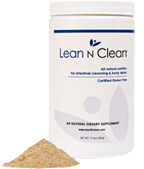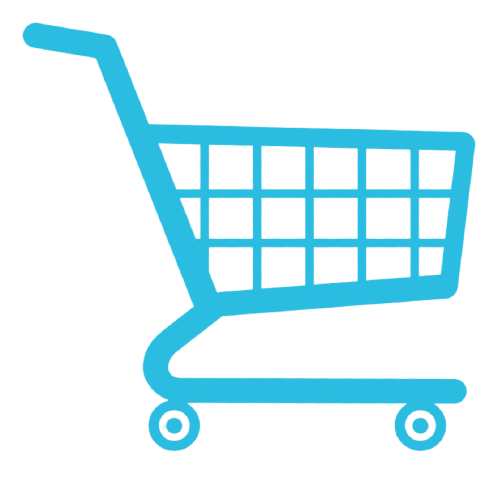Weight Loss with Lean N Clean® Smoothies
Lean N Clean® weight loss smoothie recipes may be used easily as meal replacements if you wish to lose weight. While we don’t promote Lean N Clean® specifically as a weight loss supplement, many of our customers have reported that they’ve lost weight while using Lean N Clean® for intestinal/colon cleansing to solve their intestinal problems. More importantly, they’ve kept it off with regular maintenance in addition to dietary and lifestyle changes.

As Lean N Clean® performs its detox cleanse, it also sweeps the colon and helps accumulated and compacted waste to leave the body. When built up residue is removed from the intestines, you naturally lose its equivalent in weight in addition to the inches taken up by its storage. Moreover, your body will be better able to increase its absorptive power of micro nutrients. When you are nutritionally sufficient, you will have less hunger pain between meals. Consequently, you will crave less food. You may also find that with improved dietary and lifestyle changes that you crave more healthy food as you see the impact it has on your body and overall health.
DISCLAIMER: Individual result may vary.
Risks of Diet Pills
Our feeding behavior is controlled by the “feeding” and “satiety” centers in the part of the brain called the hypothalamus. Most prescription and non-prescriptions diet pills, including certain herbal formulas, are amphetamine-like drugs and therefore work just like amphetamines by controlling our appetite through the nervous system. Some diet pills achieve appetite suppression with a direct stimulant effect on the “satiety center.” Others stimulate the “sympathetic nervous system,” which also leads to suppression of appetite. However, there are many undesirable side effects related to these types of diet pills as listed in package inserts and in medical references as follows:
Cardiovascular: fast heart beat, high or low blood pressure, fainting, chest pain. (Not recommended for people with high blood pressure or heart diseases).
Central Nervous System: overstimulation, nervousness, restlessness, dizziness, insomnia, weakness or fatigue, malaise, anxiety, tension, euphoria, elevated mood, drowsiness, depression, agitation, confusion, tremor, incoordination, headache, change in libido, rarely, psychotic episodes.
Note: Fenfluramine (Pondimin) and dexfenfluramine (Redux) may cause depression, drowsiness and impotence. Withdrawal symptoms (muscle incoordination, tremor, disturbed concentration and memory, loss of sense of reality, visual hallucinations, depression, suicidal feelings) have been reported following discontinuation of a one month course of fenfluramine, 60 mg/day.
- Gastrointestinal: dry mouth, unpleasant taste, nausea, vomiting, abdominal discomfort, diarrhea, constipation, stomach pain.
- Allergic: Urticaria, rash, erythema, burning sensation.
- Ocular: Mydriasis, eye irritation, blurred vision.
- Sexual And Urinary: painful urination, urinary frequency, impotence, menstrual upset.
- Blood: bone marrow depression, decrease in white blood cell count.
- Miscellaneous: hair loss, ecchymosis, chest pain, excessive sweating, clamminess, chills, flushing, fever, muscular pain, excessive development of male mammary glands. In addition to the side effects mentioned above, diet pills are ineffective without calorie restrictions. Tolerance to the appetite suppressant effects of diet pills may develop within a few weeks. Cross-tolerance is universal (meaning if you are tolerant to one diet pill, you will be tolerant to all other diet pills with similar mechanism of action). Since diet pills are related to amphetamines in chemical makeup, they are similar in actions and have abuse potential. Intense psychological or physical dependence, along with severe social dysfunction may be associated with long-term therapy or abuse. Therefore, therapy with diet pills should not exceed a 6-month duration. Dosage must be gradually reduced to avoid withdrawal symptoms, such as extreme fatigue and mental depression. Chronic intoxication is manifested by severe skin eruptions, marked insomnia, irritability, hyperactivity, and personality changes. Psychosis, often clinically indistinguishable from schizophrenia, is the most severe manifestation.
Note: On September 8, 1997, Florida medical regulators banned prescriptions of the “fen-Phen” diet pill combination after reports of possible heart damage resulting from using fenfluramine and phentermine in combination. A medical examiner blamed “fen-phen” in part for the July, 1997 heart attack that killed 53-year-old wife of North Miami Beach’s mayor.
Additional cautions: beware of other herbal formulas for weight-loss, which claim to be natural. Some of them work very similar to typical diet pills, because they contain amphetamine-like ingredients. Whether or not the active ingredients of these herbal formulas are stated, they are usually not recognized by the average consumer. When considering usage of such “natural” herbal formulas, watch for ingredients such as the following:
Ephedra (Ma-huang): Although Ephedra is an ancient Chinese herbal medicine used mainly for asthma (also used as an appetite suppressant), this does not make it an innocuous substance. Ephedrine is a drug extracted from Ephedra. It is a precursor of methamphetamine and therefore has the street nickname of “SLOW SPEED”. Ephedrine, either as the sole active ingredient or in combination with other therapeutically insignificant ingredients, is subject to the Controlled Substance Act and Trafficking Act of 1988 and the Domestic Chemical Diversion Act of 1993 (AHFS Drug Information, 1997). The adverse effects associated with long-term use of Ephedra are not desirable.
Guarana (Paullinia Cupana): Recent scientific findings show that the medicinal virtues of this plant are probably largely due to its caffeine content, which is higher than any other plant source and 2.5 times that of coffee (“Herbs that Heal” by Michael Weiner, Ph.D. & Janet A. Weiner).
Mate (Ilex Paraguensis): In South America this is a popular drink due to its high caffeine content (“Herbs that Heal” by Michael A. Weiner, Ph.D. and Janet A. Weiner). This herb is included in some herbal formulas for weight-loss since caffeine has appetite suppressant properties.
The half-life of caffeine can be extended up to 18 hours when combined with other central nervous system stimulants. Heavy drinkers of caffeinated products often develop nervousness or become jittery. Caffeine can rob the body of B vitamins as well as C, zinc, potassium and other minerals, and can increase the acidity in your gastrointestinal tract which may lead to rectal itching and activation of duodenal ulcers. In addition, caffeine can dangerously increase heart rate and blood pressure when taken with decongestants or bronchodialators such as the inhalers Proventil, Ventolin, Bronkaid, and Primatine. (“Vitamin Bible” by Earl Mindell R.Ph, Ph.D.
These herbs taken together will give you strong central nervous system stimulation and suppress your appetite, much like most diet pills that are “Amphetamine-like” drugs. These types of products should not be taken for a long term, because they are addictive and have abuse potential. Also, they should not be taken if you have high blood pressure, heart or thyroid disease, and should not be taken after 4:00 p.m. due to the side effect of insomnia.
Products
Lean N Clean®
Digestive Issues
- Diverticulitis
- Crohn’s Disease
- Celiac Disease
- Irritable Bowel Syndrome (IBS)
- Constipation
- Hemorrhoids
- Acne Cure and Prevention
- Bad Breath Cure and Prevention
- How to Regulate Your Bowel
Cleansing Benefits
Digestive Health
- Visit www.acidgone.com to learn about our Acid Reflux/GERD/heartburn- product- Acidgone®
- Read About How You Can Avoid Being a Willing Medical Victim on willingmedicalvictims.org
- Are you an independent thinker? Share your important thoughts to benefit humanity on debateandshare.com

